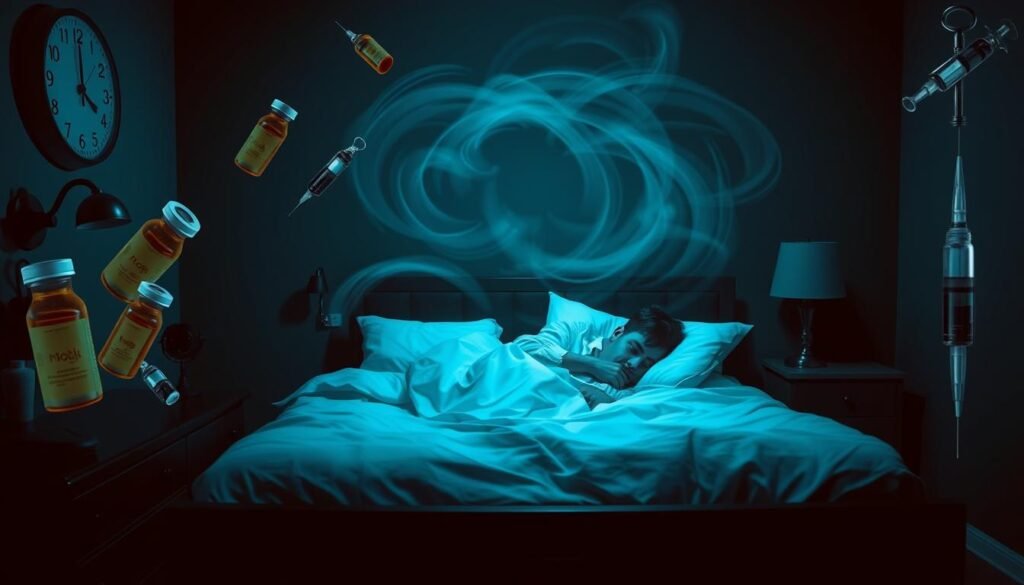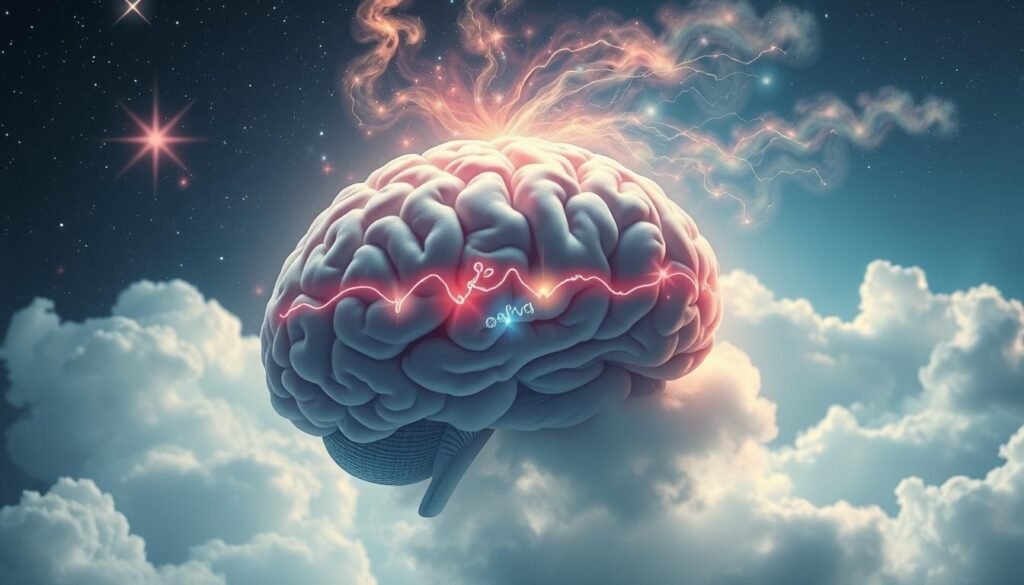Did you know about 18.4% of people getting high doses of corticosteroids report insomnia? That’s over 80 mg. This surprising fact highlights a side effect that’s often missed with steroid injections. Though cortisone shots are known for reducing inflammation and easing joint pain, they also have potential sleep side effects. Understanding how these injections lead to insomnia can help manage health and sleep better.
Medical experts are using steroid injections more for different conditions. It’s important to see how they affect sleep, particularly insomnia. This article will explain the impact of steroid shots on sleep, why they can cause insomnia, and how to deal with these issues. Knowing the side effects helps make better health and sleep choices when needing these treatments.
Key Takeaways
- High doses of corticosteroids can lead to psychiatric reactions, including insomnia.
- Corticosteroid injections, like cortisone shots, are effective for inflammation and joint pain but may affect sleep quality.
- Sleep disturbances related to steroid use can last days to weeks after discontinuation.
- Managing the timing and dosage of steroid injections can help mitigate insomnia.
- Consulting healthcare professionals is crucial for managing sleep side effects when using steroids.
Understanding Steroid Shots
Steroid shots, especially corticosteroids, help with pain relief and control inflammation. They are used for different musculoskeletal conditions like arthritis, tendon issues, and sciatica. Knowing how these shots work helps patients decide if they’re right for them.
Corticosteroids like hydrocortisone, triamcinolone, and methylprednisolone reduce inflammation. This eases stiffness and pain. People with joint pain or inflammatory bowel disease find these shots helpful. Often, the relief lasts 3 to 6 months. Yet, some might feel better for even longer.
However, these shots can have side effects. Some people might feel more pain at first. After 24 hours, this usually goes away as the shots start to work. Older adults, those 65 and up, might have trouble sleeping after getting a shot. This can last from a day to three days. It’s important to watch out for this.
Before getting a steroid shot, talk to a doctor. They’ll check your health and any other conditions you might have, like diabetes or high blood pressure. Fully understanding these shots helps you get the best results for your condition.
How Cortisone Shots Work
Cortisone shots help treat conditions linked to inflammation and pain. They come from the corticosteroid family and mimic hormones from the adrenal glands. This helps reduce body inflammation effectively.
These injections target the affected area directly, providing relief. They help reduce pain significantly. This can make it easier for patients to engage in physical rehab. But, these shots mainly manage discomfort, without healing the problem itself.
Only a small number of people (5.8%) might experience side effects, such as pain and swelling at the injection site. Despite these effects, cortisone shots are vital for support in therapy. Knowing about potential side effects is key for planning treatment.
The Benefits of Steroid Injections
Steroid injections offer many benefits of steroid injections that improve life quality. They help control pain and aid in rehabilitation after injuries or surgeries. Cortisone shots are effective for conditions like frozen shoulder. They show better results than oral medications, NSAIDs, and physical therapy.
For carpal tunnel syndrome, cortisone shots provide short-term relief for many patients. They also have high cure rates for trigger finger. These successes highlight how cortisone shots enhance mobility. This allows for more effective therapy exercises.
Corticosteroid injections give relief for conditions like bursitis by the femur head. They work better than physical therapy or painkillers at 6 weeks and 3 months. These injections’ effects can last days to months. This supports rehabilitation that boosts physical activity.
The cost of cortisone shots varies, with prices between $100 and $300. Sometimes, it can go over $1,000. The average cost is $84 in clinics and $146 in hospitals. Despite this, severe side effects are uncommon. People should watch for increased pain, fatigue, or vision issues and get medical help.
In summary, cortisone injections are highly beneficial for pain control and rehabilitation. They let patients improve their quality of life while managing chronic pain. For more info on corticosteroids, check out this resource.
Can Steroid Shots Cause Insomnia
Cortisol injections show a strong link to sleep problems. People getting these shots often have trouble sleeping. This makes scientists wonder if these shots can cause insomnia. Studies show sleep issues are common after these injections, especially in older folks. The issues usually last from one to three days.
People often feel too energetic or “wired” after getting a steroid shot. This energy boost can make it hard to sleep. It’s like how you feel after drinking too much coffee.
Connection Between Steroid Use and Sleep Disturbances
Steroid shots can mess with your sleep. They can change your sleep patterns, making your sleep worse. You might find yourself awake when you should be asleep. These shots impact your body’s sleep-wake cycle. They can really disrupt your sleep.
Common Sleep Side Effects Reported
People who get epidural steroid shots report many sleep problems. These include:
- Difficulty falling asleep
- Frequent awakenings during the night
- Reduced sleep quality overall
Some also feel hot flashes or warmth in the face and chest. While serious reactions like allergies are rare, these shots can still affect your sleep in many ways. It’s crucial to talk to your doctor about these insomnia side effects. This ensures you get the right help and guidance.

| Side Effect | Duration | Frequency |
|---|---|---|
| Insomnia | 1-3 days | Common |
| Steroid Flush | Several days | Occasional |
| Pain Exacerbation | Varies | Rare |
Knowing how steroid injections affect sleep helps us get ready for treatment. Making small changes in dosage or when you get the shot might help. This could let you sleep better at night.
Other Side Effects of Steroid Injections
Steroid injections help with many medical issues, but they can have side effects. It’s important for patients to know these effects to prepare for treatment.
Physical Reactions to Steroid Shots
Physical reactions to steroid shots are common. Some reactions include:
- Pain or swelling at the injection site
- Facial flushing or a feeling of warmth
- Thin or pale skin
- Temporary increase in appetite
- In rare cases, headaches when injected in the spine
To prevent harm, it’s best to limit injections to three or four times a year. Knowing about these reactions helps patients set their expectations.
Mood Changes and Their Impact on Sleep
Mood changes often happen with steroid injections. They can make you feel more irritable or anxious. This can lead to trouble sleeping.
Mood swings and sleep problems are linked. Corticosteroids can really affect your mood and sleep. For tips on managing these effects, check out this helpful resource.
Knowing about the physical and emotional effects of steroid shots is key. This knowledge helps manage symptoms and improves treatment results.
The Role of Hormonal Changes in Sleep
Hormonal changes can greatly affect how well we sleep. Corticosteroids, which are made to act like cortisol, help control many body functions. This includes our sleep-wake cycle. But when people take steroid treatments, these artificial hormones can upset their natural hormone levels. This might lead to trouble sleeping.
About 73% of people taking oral prednisolone for lung disease report sleep problems. They often feel insomnia and restlessness. The worry caused by these hormonal imbalances can make sleeping even harder. This creates a vicious cycle of poor sleep and more stress.

Corticosteroids can also make people hungrier and gain weight, which affects sleep too. Over 70% of those on long-term steroid therapy see their weight go up by 4% to 8% after two years. This weight gain can make sleeping difficult due to discomfort and the risk of sleep apnea.
The amount and how long someone takes corticosteroids also matter. They can lead to mood and mental health changes in 2% to 60% of patients, depending on the dosage and length of therapy. This shows how important it is to understand hormone changes and sleep. Especially for those on steroid treatments to manage their sleep better.
How Different Ages React to Steroid Shots
Different ages respond to steroid injections in varied ways. Older patients face unique challenges and side effects. This makes their reactions to steroids an essential factor in treatment. They are more sensitive to both the good and bad effects. This is especially true when treating chronic pain.
Specific Risks for Seniors
Seniors face higher risks of side effects from steroid shots. One issue they might face is insomnia. This can make managing chronic pain harder. It can also lead to increased agitation and irritability. This affects their overall well-being.
- Elderly patients may develop mood swings, anxiety, or even depressive symptoms during corticosteroid therapy.
- Cognitive impairment related to steroid use has been observed in some seniors, affecting memory and clarity of thought.
- Weight gain, often seen with long-term steroid use, can be particularly challenging for elderly individuals concerned about mobility.
- Increased blood sugar levels may pose dangers for seniors with pre-existing diabetes, necessitating careful monitoring.
- Due to potential agitation and mental disturbances, careful evaluation prior to treatment is essential for this vulnerable population.
Healthcare providers must adjust their monitoring for elderly patients. Studies show one in five on high-dose steroids gain a lot of weight. Also, 26% show manic behavior if they have conditions like eye disorders. It’s important to manage these side effects well.
Handling side effects in seniors is key. It improves their life quality and helps with chronic pain management.
Menopausal Insomnia: Related Considerations
Menopausal insomnia brings its own set of challenges for women. Changes in hormones greatly influence sleep quality. Understanding what causes these changes is key. Estrogen and progesterone levels swing, leading to sleep problems. This can make existing insomnia worse.
Link Between Hormone Changes and Sleep Issues
Studies show many women facing menopause have trouble sleeping. About 40% to 56% of midlife women experience sleep issues, unlike 31% of premenopausal women. Hormonal changes worsen insomnia, leading to a tough cycle of sleep problems. Over 60% of women on corticosteroids like prednisone have insomnia as well. This shows how hormone changes can impact sleep.
Managing Sleep Disturbances During Menopause
Handling sleep problems during menopause is key for health. Women should start by talking to healthcare providers about their insomnia. This includes finding the right medication and its dosage. Good sleep habits are important. Creating a calming routine before bed can improve sleep quality.
Adding relaxation techniques like deep breathing or gentle yoga helps. Cognitive behavioral therapy could provide a more lasting solution. Tackling insomnia needs a full approach, blending medical and lifestyle changes. Looking into resources about hormone interplay can offer more insight. Click here to learn more.

Natural Remedies for Menopausal Insomnia
Dealing with menopausal insomnia can be hard, but there are natural remedies that help. Lots of women prefer these over hormone therapy. These methods help them sleep better and have fewer sleep problems.
Effective Strategies for Better Sleep
Changes in lifestyle, using relaxation techniques, and eating differently are key. Here are some useful strategies:
- Herbal remedies: Black cohosh and red clover are popular for reducing hot flashes that disrupt sleep.
- Relaxation techniques: Yoga, meditation, and deep breathing can relax your mind. This makes falling asleep easier.
- Dietary adjustments: Foods high in isoflavones like soybeans can ease menopause symptoms.
- Regular exercise: Being active improves sleep quality and lessens insomnia.
Certain supplements, like Evening Primrose Oil, lessen hot flashes and improve sleep when taken regularly. Studies show women often try these natural remedies for menopausal relief.
| Natural Remedy | Potential Benefits | Considerations |
|---|---|---|
| Black Cohosh | Reduces hot flashes | May cause mild gastrointestinal upset |
| Red Clover | May alleviate hot flashes | Potential hormonal effects |
| Evening Primrose Oil | Decreases frequency of hot flashes | Monitor for allergies |
| Valerian Root | Improves sleep quality | Possible mild sedative effects |
Using these natural remedies can greatly help with restful sleep. Always talk to a health professional when trying new remedies for menopausal insomnia.
Conclusion
Steroid shots and insomnia have a complex link that matters to patients and healthcare providers. A detailed look at the evidence shows steroid injections can relieve lower back pain. But, they can also disrupt sleep. The effect of steroid shots on sleep depends on the dose and the person’s health.
It’s important to watch how steroid injections affect patients overall. Studies link negative emotions and sleep problems to the results after getting a shot. Talking about potential side effects, like insomnia, is critical for good medical care. Custom treatment plans are key to handling sleep issues well.
Educating patients is vital when dealing with steroids. Knowing about the possible side effects helps. So does keeping in touch with healthcare providers. This way, patients can look after their health better.